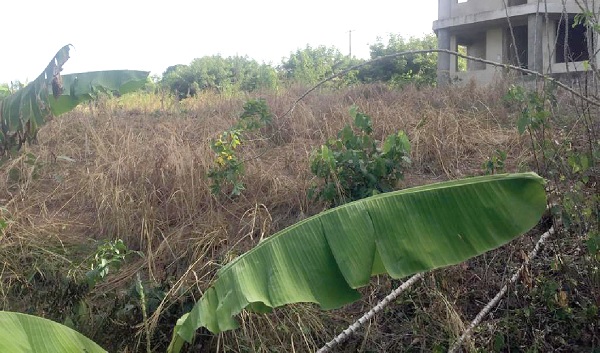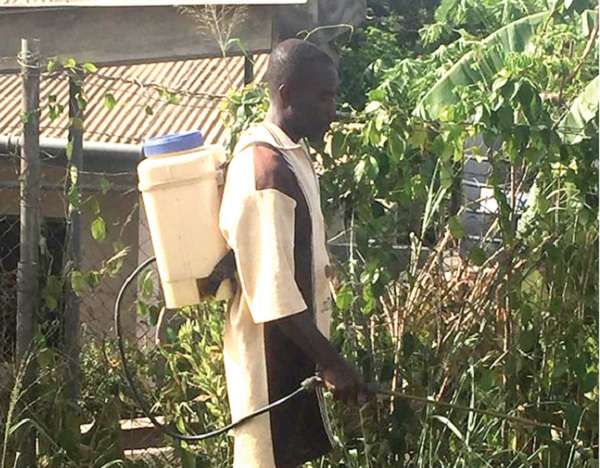
Pesticides boon or bane?
The caption of this article was a question I set for my final year students in my course in Pest Management about 30 years ago.
Advertisement
Little did I know that one day, I would have cause to ask the whole nation this same it. Indeed, it is now time for all to take a critical look at pesticide use.
The question divided the class into two groups, with one group finding the question difficult and considering it a bane, as pesticides, indeed are to man, if not judiciously used. The students in this category, since they left the university, have nicknamed me, “Pesticides: Boon or Bane? Discuss”.
However, the students who found the question manageable considered it as a boon (kooko), as pesticides, indeed are, if, judiciously used.
Most Ghanaians can be placed among the second group of students from the way pesticides are loosely used in the country as if they are not dangerous, but, indeed, they are!

Attitudes to pesticide use
From our bedrooms to other living areas in and around our homes, pesticides, such as insecticides, rodenticides and herbicides are applied frequently to control mosquitoes, mice and weeds, respectively.
Fungicides, insecticides and herbicides are frequently applied on our farms and in our gardens to ensure good quality and high yields.
Herbicides have virtually replaced human labour, and it is not only very expensive but also scarce and not dependable.
It is amazing to see people comfortably sitting in areas sprayed with sweet-scented insecticides or being fumigated with smoke from coils as if an air freshener has been used.
Sadly, they are innocently killing themselves silently and slowly! However, the generous pungent smell of a pesticide serves as a warning for people to keep off from the danger of sprayed areas at home in particular, for at least between 20 to 30 minutes.
Farmers
Many of our farmers have different perceptions about pesticides; some think pesticides are harmful only to pests and are harmless to man.
Many have the notion that pesticides sprayed on vegetables cannot be detected. Many believe that small doses of pesticides on the skin do not affect the body, no matter the number of times of exposure.
Hence, their attitude towards pesticides has been that there is no need to wear protective clothing during pesticide application.
They believe that one can stop spraying and eat or drink and then go back to continue spraying.
For them, they think it is not necessary to always wash yourself and your clothing after pesticide application, or necessary to observe pre-harvest intervals for pesticides that is, the time allowed for sprayed pesticides on farm produce to break down before being harvested for consumption.
Farmers also believe that vegetables can be washed to remove pesticides sprayed on them and that it is okay to use pesticide containers as drinking cups, for storing salt and cooking oil after washing them.
There are dangers in the indiscriminate use of pesticides. There is an urgent need for the judicious use of pesticides, both in health and agriculture, to preserve our environment for healthy living and posterity.
Pesticides:
What are they?
According to the National Institute of Environmental Health Science (2022), a pesticide is any substance used to kill, repel and control certain forms of plant and animal life that are considered pests.
Pests are animals and plants which harm us and cause damage to our crops. In our fight against them to protect our health and crops, we have resorted to the use of various pesticides, which are toxic compounds and can kill both man and pests.
The only difference is that the concentrations of pesticides that can kill pests are lower than those fatal to man so that they can be safely handled and applied.
However, repeated exposure to low concentrations makes them harmful to man.
Pesticide is the general term given to all the toxic compounds developed for the control of both medical and agricultural pests.
However, the various toxic compounds developed for the control of a specific type of pest have been named to reflect the target pest.
For instance, the specific pesticides for the control of insects, fungi, mice, nematodes and weeds are termed insecticides, fungicides, rodenticides, nematicides and weedicides, respectively.
Pesticide formulation
On the market, we buy pesticides in various forms. The various forms are not in their pure technical state, which is dangerous to handle.
The technical products for the market are prepared into forms termed formulations, which are safe to handle and apply because they contain the right concentrations of active ingredients, which are effective against pests.
Some of the formulations on our market are sprays, dust, granules, smoke coil and wax blocks.
Pesticides being formulated for safe handling and application do not mean that they should be handled without great care.
Pesticide poisoning
Even though the various pesticides we use contain low concentrations of their active ingredients meant to kill pests, our repeated exposure to them can lead to a buildup of their concentrations in the human body.
The vital functions pesticides disrupt in pests leading to their death are the same as those of man.
These vital functions in living organisms are the nervous, digestive, circulatory, respiratory and reproductive systems. Some pesticides have carcinogenic effects on man.
We are being poisoned either gradually or suddenly when pesticides enter our body through the mouth, nostrils and skin. The ability of a pesticide to harm us through the mouth is referred to as its oral toxicity.
These are the adverse effects occurring in the body after an oral intake of a single dose of a substance, or multiple doses taken within 24 hours (National Research Council, 1977).
A single dose of a pesticide taken orally rarely kills, except in the case of exposure to Class A pesticides, which are very lethal, or someone who intentionally wants to commit suicide.
However, we are taking multiple doses of pesticides as we eat our vegetables and fruits.
As farmers spray the crops for high and good quality yield, some pesticide residues are left on the produce they harvest for the market.
These residues are not harmful if farmers observe the pre-harvest intervals of the pesticides they use.
The pre-harvest interval of a pesticide is the period one needs to observe before the product is harvested after pesticide application.
This is to allow residues of the active ingredient, that is, the breakdown of the active ingredients of the pesticides before the produce is harvested.
After the given intervals, pesticide residues on produce are not harmful, because their active ingredients break down, except for pesticides with zero tolerance limits.
The residue of such pesticides should not be found at all on produce harvested for the market
For vegetables like okra, their economic parts have shorter maturity periods than the pre-harvest intervals of most of our vegetable pesticides, so, the chance of residue remaining on harvested produce is high.
For instance, the economic maturity period of the okra fruit, for most cultivators, is between three and four days. However, most of our vegetable pesticides have a pre-harvest interval of between two and three weeks.
It is, therefore, advisable that such vegetables and fruits bought from farms, shops and marketplaces should be thoroughly washed with water and rinsed in salt water or a vinegar solution to reduce the amount of pesticide residue before consumption.
We are also poisoned through the nostrils and skin, because as we spray, we breathe in some of the sprays and some land on our skin, especially the face.
The degree of the poisoning depends on how long we are exposed to the pesticide.
For sprays, the total concentrations, whether inhaled or deposited on our skin, have been measured.
Acute inhalation toxicity is the total adverse effects caused by a substance, following a single uninterrupted exposure by inhalation over a short period e.g., 24 hours or less, to a substance capable of being inhaled.
And for poisoning through the skin, acute dermal toxicity is the adverse effects occurring within a short time of dermal application of a single dose of a substance (National Research Council 1977).
Such extreme occurrence of pesticide in the air and on our body hardly occurs unless it is a planned suicide, or always staying in sprayed areas, as if they have not been sprayed.
As we frequently expose our bodies to sprayed pesticides, the seemly harmless substance gets into our system through the nostrils and skin.
The fat-soluble ones get accumulated in our fats and marrow until they get to acute levels.
It is when we are depending on our fats and marrow during old age or recovering from a serious sickness that pesticides are released from the fatty tissues and marrow into our system and that is when their effects are felt.

Environmental Impact
Apart from our health being affected, our environment is also affected by the indiscriminate use of pesticides, which tend to affect our wildlife.
There were some wildlife and crops which were prevalent before the widespread use of pesticides, but are now scarce or extinct.
Bees which are very sensitive to some insecticides appear to be scarce of late.
Snails, mushrooms and earthworms, which tend to appear after rainfalls are scarce these days.
In the Ashanti Akyem and Akyem areas, snails appeared in abundance during the rainy season and people used lanterns at night to pick them from the bush and along roads.
In Ashanti Akyem, excess snails were shelled and strung on long sticks and dried as a means of preservation.
The stringed snails, which were popularly referred to as boramha (walking stick), sadly, are hard to find these days.
The scarcity of snails on the market now could probably be attributed to the widespread use of gramoxone-based herbicides for weed control in the country.
An experience in my backyard garden supports this observation. Before I started using gramoxone-based herbicide (knock-down) to control weeds in cassava plots, I used to collect snails after rains in Cape Coast.
The possibility of the gramoxone-based herbicide influencing the population of snails and earthworms is high since gramoxone-based herbicides tend to be absorbed by the clay and humus components of the soil, which are parts of the food chains of snails (FAO, 1986) and earthworms (Lee, 1985).
And the chances of these soil creatures being eliminated by clay and humus particles contaminated by these types of herbicides are high.
The scarcity of cocoyam on the market could also be attributed to herbicides or their residual effects.
Some herbicides can remain in the soil for some time after they have effectively cleared targeted weeds. It is most likely that cocoyam is sensitive to the herbicides widely used in growing areas.
The prevalence of mosquitoes in Ghana, despite the frequent spraying of insecticides and regular use of mosquito coils, should tell us that mosquitoes are far from being effectively managed by the use of various insecticides on our market now.
The current breed of mosquitoes in Ghana may have developed insecticide resistance. If my observation is true, then we have a serious malaria problem ahead of us, because the more we continue to use mosquito sprays, the tougher the mosquito would become.
National pesticide policy
The changes in the populations of our wild lives should be considered seriously before we observe changes in man as a result of the current widespread use of pesticides in Ghana.
In light of these observed changes, the National Pesticide Policy should be reviewed in the direction of the proper handling and use of pesticides in Ghana.
A Pesticide Board should be established and mandated to evaluate, legislate and supervise the marketing of pesticides in Ghana.
The board should have research institutes across the country to study the environmental impact of the various pesticides being used in the country.
We need to know the extent to which herbicides used by house owners and farmers are influencing cocoyam cultivation and the populations of snails, mushrooms, earthworms, toads and frogs in the environment.
There is also the need to know the link between the use of rodenticides and the disappearance of vultures in Ghana.
A study should be carried out on the influence of the various mosquito sprays and coils on the behaviour and population of mosquitoes in Ghana.
The board should have an educational unit to prepare teaching materials on the proper use of pesticides for sellers, hawkers and users.
Hawkers of pesticides in the marketplaces need to be trained so that they would be in a better position to explain the proper use of pesticides and desist from playing jingles to attract clients, such as nnuro papa afiri China (good pesticides from China) and ekum mmoa ahodoↄ pii (it kills several species of insects).
These jingles only emphasise the killing power of pesticides but do not warn of their possible harmful effects, and the fact that they should be applied with great care.
Pesticides are like a double-edged sword; they are both boon and bane depending on their judicious use. In the interest of our survival and for posterity, we all have to learn to apply pesticides with great caution to avoid the occurrence of a ‘silent Ghana’ in the future, like the occurrence of Silent Spring in the USA (Rachel 2002), as a result of the widespread use of organochlorine pesticides, which killed most birds in a particular spring, when bird lovers were waiting to hear birds sing, but there was only silence.
This led to the banning of the use of organochlorines for the first time in the USA, and I hope we are not expecting such a situation to occur in Ghana as a result of our unstructured use of pesticides before we take action.
Only a strong policy and good public education on pesticide use can save both the present and future Ghanaians from pesticide poisoning.
This is a clarion call!
The writer is a retired lecturer, he resides at Asiama Eyifua, Cape Coast
E-mail: [email protected]



